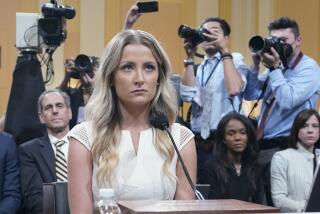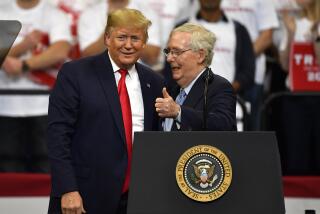Obama says Trump is ‘unfit to serve,’ and Trump threatens to walk away from leading Republicans

President Obama declared Tuesday that Donald Trump is unfit to serve as commander in chief and called on Republicans to rescind their endorsements of their presidential nominee.
When President Obama declared Tuesday that Donald Trump was unfit to be commander in chief and suggested Republicans would be wise to break from their nominee, GOP leaders could be forgiven for discounting the advice of the leader of the opposition.
What they might not have counted on was that within hours, Trump himself would threaten to abandon them first.
The high-wire political tactics from both Obama and Trump backed Republican lawmakers into a predicament amid another day of controversial statements and erratic behavior from the GOP nominee.
Obama said Republicans’ repeated denunciations of Trump’s actions — most recently for a spat with the family of an Army captain killed in Iraq — rang hollow if they continued to endorse him.
“There has to come a point at which you say, ‘Somebody who makes those kinds of statements doesn’t have the judgment, the temperament, the understanding to occupy the most powerful position in the world,’” the president said at a White House news conference.
Trump appeared to invite open warfare within his party by signaling he would not back House Speaker Paul D. Ryan or Arizona Sen. John McCain in their reelection bids.
“I like Paul, but these are horrible times for our country,” Trump told the Washington Post, one day after he tweeted support for Ryan’s GOP primary rival. “We need very strong leadership. We need very, very strong leadership. And I’m just not quite there yet. I’m not quite there yet.”
Election 2016 | Live coverage on Trail Guide | Sign up for the newsletter
His utterance echoed Ryan’s own hesitation in May to endorse Trump before finally backing Trump’s presidential run.
On McCain, the party’s 2008 presidential nominee, Trump took a harder line. “I’ve never been there with John McCain because I’ve always felt that he should have done a much better job for the vets,” Trump said.
The refusal to endorse fellow Republicans renewed attention on internal party squabbling at a time when the GOP is racing to mount a united front in the general election fight and make its case against Hillary Clinton.
McCain had said that Trump’s complaints about Khizr and Ghazala Khan, the parents of fallen Army Capt. Humayun Khan who denounced Trump last week, “do not represent the views of our Republican Party, its officers, or candidates.” McCain said that though he still supported Trump, his nomination was “not accompanied by unfettered license to defame those who are the best among us.”
Ryan and Senate Majority Leader Mitch McConnell (R-Ky.) had also expressed support for the Khans but did not mention Trump by name. On Tuesday, spokespeople for each declined to comment on Obama’s assertions.
Zack Roday, a spokesman for Ryan’s reelection campaign, responded to Trump, however.
“Neither Speaker Ryan nor anyone on his team has ever asked for Donald Trump’s endorsement,” he said. “We are confident in a victory next week regardless.”
Ryan is widely expected to win his primary next week. His larger challenge, though, is maintaining party unity, at least for the benefit of his own House colleagues as they seek to hold on to their majority.
McCain faces a clearer threat both within his own party — the Arizona GOP recently censured him for his support of a comprehensive immigration reform measure — and from a Democratic challenger.
Another Trump target was first-term New Hampshire Sen. Kelly Ayotte, locked in one of this year’s closest Senate contests, who had said she was “appalled” by Trump’s criticism of the Khans. Trump, who won the state’s lead-off presidential primary, questioned why she was offering “zero support” for him. “I call it like I see it and I’m always going to stand up for our military families and what’s best for the people of New Hampshire,” Ayotte tweeted in response.
Obama said that in standing by their nominee, GOP leaders risked blurring a distinction between conservative philosophies and what he has called Trump’s demagogic views. He diagnosed Trump’s liabilities coolly and with lawyer-like precision; among them, that he “doesn’t appear to have basic knowledge around critical issues in Europe, in the Middle East, in Asia.”
“The Republican nominee is unfit to serve as president,” Obama said. “I said so last week” — at the Democratic convention — “and he keeps on proving it.”
Obama noted that he had serious policy differences with the two Republican presidential nominees he defeated, McCain and former Massachusetts Gov. Mitt Romney. “But I never thought that they couldn’t do the job,” Obama said.
“Had they won, I would have been disappointed, but I would have said to all Americans, ‘This is our president, and I know they’re going to abide by certain norms and rules and common sense — will observe basic decency,” he said.
But with Trump, Obama said, Republican leaders need to say, “Enough.”
“The alternative is that the entire party, the Republican Party, effectively endorses and validates the positions that are being articulated by Mr. Trump,” he said.
Trump responded by blaming Obama and Clinton, the president’s former secretary of State, for policy missteps at home and abroad.
“Hillary Clinton has proven herself unfit to serve in any government office,” he said in a statement. “She is reckless with her emails, reckless with regime change, and reckless with American lives. Our nation has been humiliated abroad and compromised by radical Islam brought onto our shores. We need change now.”
Matt Bennett, co-founder of the centrist Democratic think tank Third Way, saw Obama making a political argument but also one on principle.
“A major party either collapsing or experiencing crisis is not good for the other party,” he said. “When you are the president, particularly a president nearing the end of your term, his interest is not political. What he wants is for the United States to be secure, and for his legacy to be secure. And handing the country over to an unstable sociopath would endanger both things substantially.”
Third Way and the Truman National Security Project have been advising Democrats on what they call an “Admit He’s Unfit” campaign to pressure Republicans to acknowledge what they see as Trump’s liabilities. Trump’s posture toward Ryan in particular speaks to the necessity of doing so, Bennett said.
“He is not going to change. There will not be a pivot,” he said. “Trump is telling the world as loudly and as clearly as he can that ‘this is me.’ So if you think this behavior will stop with the campaign … you are crazy.”
One Republican did make a clean break with Trump. Retiring Rep. Richard Hanna of New York became the first GOP lawmaker to say he would vote for Clinton.
“I do not expect perfection,” he wrote in an op-ed in the Syracuse Post-Standard, “but I do require more than the embodiment of at least a short list of the seven deadly sins.”
And in yet another unusual campaign sight, Trump, during a rally in Virginia at nearly the same time Obama spoke, asked a mother to leave with her crying baby.
“You can get the baby out of here,” he said, a few minutes after he said he liked hearing the child’s cries.
For more White House coverage, follow @mikememoli on Twitter.
Child yells profanity directed at Hillary Clinton during Donald Trump rally
Trump mired in another day of controversy with family of soldier killed in Iraq
Despite Donald Trump cementing the GOP nomination, the Koch network keeps its distance
UPDATES:
5:50 p.m.: This story was updated with more comments from Trump.
2:40 p.m.: This story was updated with reaction from Donald Trump.
This story was originally published at 9:40 a.m.
More to Read
Start your day right
Sign up for Essential California for news, features and recommendations from the L.A. Times and beyond in your inbox six days a week.
You may occasionally receive promotional content from the Los Angeles Times.







